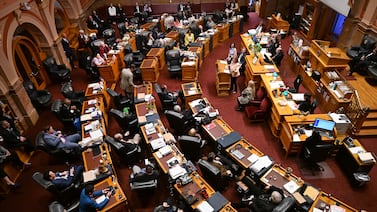Sign up for Chalkbeat Indiana’s free daily newsletter to keep up with Indianapolis Public Schools, Marion County’s township districts, and statewide education news.
Indiana senators discussed and passed controversial bills on Wednesday about social studies curriculum, sex education materials, and chaplains in public schools.
One would require schools to seek school board approval for and publicize information about their sex ed curriculum. Another would allow chaplains to work as counselors in public schools. Lawmakers also discussed legislation to restrict how teachers can approach issues like race, class, and privilege in history and social studies lessons, as well as a bill that takes aim at diversity, equity, and inclusion curriculum and training
Most of the bills echo proposals that failed in past sessions and have sharply divided Democrats and Republicans. But the bills are now moving forward in a vastly different national political landscape, one where some of these ideas have support from President Donald Trump and his administration.
Lawmakers have until Feb. 20 to approve bills in their respective chambers. That means committees have a few more weeks to complete their work and advance bills to second and third readings to the full chamber.
Notably, the House Education Committee was poised to consider a bill Wednesday expanding Indiana’s law banning transgender girls from girls’ sports at the collegiate level. But lawmakers removed the bill from the agenda.
Here’s more on what the Senate Education Committee discussed and did Wednesday.
‘Teachers shouldn’t be encouraging those pessimistic views’
Senate Bill 257 would require teachers to base history or social studies instruction on the principles of the Declaration of Independence, the Bill of Rights, and the Constitution of the United States. It also prohibits teachers from teaching that the U.S. national identity or culture has been established by racial identity or racial discrimination, gender identity or gender discrimination, victimization, class struggle, a hierarchy of privileges, or systemic exclusion. It would apply to all schools that teach these subjects.
It was authored by GOP Sen. Spencer Deery, who said he was concerned about statistics showing that young people have adopted a grim view of U.S. history, including one survey finding that more than half of young people are in favor of writing a new constitution.
“Teachers shouldn’t be encouraging those pessimistic views,” Deery said.
Deery argued that these views are “trendy, but short-sighted” and prevalent in school curriculum throughout Indiana and the United States. He denied that the bill would affect teachers’ ability to teach historical events like the Holocaust.
“Those things can be examples of ways we fell short of our ideals, or how we progressed from those shortcomings,” he said. Deery also authored last year’s controversial law on “intellectual diversity” and tenure at colleges and universities.
But Sen. J.D. Ford, a Democrat, asked whether teachers would feel uncomfortable teaching the Constitution, if they could not mention that the Constitution permitted enslavement and included the Three-Fifths Compromise, which were both forms of discrimination.
Deery said that the bill does not prohibit teaching that racial discrimination occurred, but does prohibit teaching that the country’s identity is rooted in racial discrimination.
In response to a request from Sen. Shelli Yoder, a Bloomington Democrat, to see the Indiana-specific data of these surveys, Deery said he believed most teachers were already in compliance with the provisions of his bill.
Public testimony was largely opposed to the bill. Education committee chair Sen. Jeff Raatz, a Republican, eventually decided to postpone a vote on the bill until next week to make technical corrections.
Chaplains as school counselors bill returns
Meanwhile, Senate Bill 523 revives a proposal from last year that would allow school chaplains to work as counselors in public schools on a paid or volunteer basis.
But this year’s version seeks to address past criticisms by requiring that the chaplains have some counseling experience.
Communication between students and chaplains would be confidential, with a few exceptions. Chaplains would provide secular “advice, guidance and support,” but could provide nonsecular support to students if a student and the student’s parents allowed it.
Bill author Sen. Stacey Donato, a Republican, said chaplains already work in public schools for sporting and other special events and could help students in crisis.
“Chaplains are not a new concept. The idea of a chaplain is not to convert people to a different religion. They are there to support people, regardless of their faith,” Donato said.
But Indianapolis Democratic Sen. Fady Qaddoura said in most other contexts, chaplains work with adults, rather than children. He asked what kind of secular support a chaplain could provide, to which Donato suggested tying shoes, zipping coats, and opening ketchup packets.
During testimony, Christopher Lagoni, executive director of the Indiana Small and Rural Schools Association, said church leaders already volunteer in schools and sometimes eat lunch with students, for example. He did not know of any working as counselors.
Both the Indiana School Boards Association and the Indiana Association of Public School Superintendents also expressed support for the bill, saying it allowed for local control.
But ACLU of Indiana Executive Director Chris Daley expressed concern that the bill would violate the U.S. Constitution’s Establishment Clause. Other speakers during public testimony — including religious leaders — questioned whether chaplains had the right training to work with students.
The bill passed out of the education committee on party lines.
Schools must publicize sex ed curriculum
Senate Bill 442 would require a public school that teaches sex education to obtain school board approval for the curriculum by submitting information about topics that will be taught, whether a male or female teacher will lead the course, and whether male and female students will take the course together.
The district must also publicize this information on its website.
Indiana law currently does not require schools to teach sex education other than providing information about HIV, but those that do must emphasize abstinence. In 2023, lawmakers prohibited any human sexuality instruction before third grade.
Before the vote, senators approved an amendment to remove private schools from the requirements. They voted down an amendment that would require any sex ed curriculum to include instruction about contraceptives, consent, and healthy relationships.
The bill passed on party lines Wednesday. Qaddoura expressed concerns that the bill would lead to political fights at school board meetings.
“It will really rile up people against our school boards in different communities,” Qaddoura said.
Senators poised to pass anti-DEI bill
The Senate as a whole has already taken a major step toward restricting diversity, equity, and inclusion (DEI) in schools.
On Tuesday, Senate Bill 289 advanced through second reading of the Senate, with an amendment to incorporate some of the language of Senate Bill 235.
The bill would restrict mandatory diversity training in public K-12 schools and ban the hiring of DEI trainers and consultants at state universities. SB 289 also requires schools to post instructional and curricular materials online that relate to DEI, race, ethnicity, sex, or bias.
The combined bill does not include a long list of concepts initially included in SB 235 — like bias, allyship, cultural appropriation, microaggressions, social justice, heteronormativity, and gender theory. Bill author Sen. Tyler Johnson, a Republican, saying he felt “like we couldn’t define some of the terms in there.”
But the bill does define DEI as any effort to manipulate the composition of employees with respect to race or sex, to provide differential treatment on the basis of those characteristics, or other training or policies not expressly required to comply with federal law.
The bill could pass the full Senate as early as Thursday.
Aleksandra Appleton covers Indiana education policy and writes about K-12 schools across the state. Contact her at aappleton@chalkbeat.org






